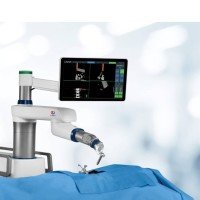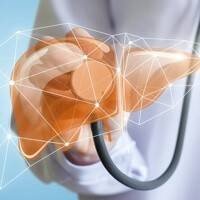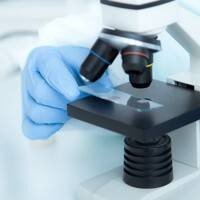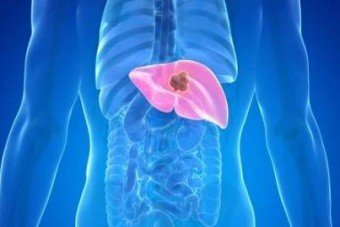Liver cancer is the 4th most common cancer among men and the 12th most common cancer among women in Hong Kong. According to the Hong Kong Cancer Registry of the Hospital Authority, there were 1612 new cases in 2022, with 1173 cases in men and 439 cases in women, a male to female ratio of about 2.7 to 1. Before the age of 75 years, the cumulative risk of liver cancer is 1 in 54 for men and 1 in 219 for women. The median age of diagnosis is 66 for men and 73 for women.
Rapid declining age-standardized incidence was observed in liver cancer. On average of the previous 10 years, there has been a decrease per year in the age-standardized incidence by 2.3% in males and 4.8% in females.
There are two types of adult primary liver cancer, namely hepatocellular carcinoma (HCC) and bile duct cancer (cholangiocarcinoma). The most common type of adult primary liver cancer is hepatocellular carcinoma.
Liver Cancer Incidence and Survival Rates
Liver cancer is one of the most common malignant tumors worldwide, with particularly high incidence rates in Asia. As part of Asia, Hong Kong also experiences elevated liver cancer incidence and mortality rates. According to data from the Hong Kong Cancer. Registry in 2022, liver cancer ranks third among the top ten causes of cancer deaths in Hong Kong, surpassed only by lung cancer and colorectal cancer. This highlights the significant threat liver cancer poses to public health.
Survival Rates
The survival rate for liver cancer is closely tied to the stage at which it is detected. Patients diagnosed with early-stage liver cancer who undergo appropriate treatments, such as surgical resection or liver transplantation, can achieve a five-year survival rate of 50% to 70%. However, because liver cancer often presents no noticeable symptoms in its early stages, many patients are diagnosed at an advanced stage, significantly reducing treatment effectiveness and survival rates. The five-year survival rate for patients with advanced liver cancer is typically below 10%.
Causes
Known causes of liver cancer include:
- Cirrhosis
- Hepatitis B or C infection
- Long-term alcoholism
- Consumption of food contaminated by aflatoxins
- Haemochromatosis
- Ingestion of oral contraceptives that contain certain ingredients
- Ulcerative colitis (UC)
- Liver fluke
- Consumption of food containing toxins
- Long-term exposure to certain environments or pollutants
- Cholangitis or choledochal cysts
Symptoms
Symptoms may not be apparent during the early stages of liver cancer. As the tumour grows larger, patients may experience the following symptoms:
- Loss of appetite and significant weight loss
- Upper abdominal and right shoulder pain
- Upper abdominal pain, discomfort, or lumps
- Jaundice, yellowing of the skin and eyes
- Tea-colored urine, clay-colored stools
- Ascites (accumulation of fluid in the abdominal cavity)
However, these symptoms are not unique to liver cancer. If the above symptoms appear, there is no need to worry too much but medical attention should be sought as soon as possible so that any necessary diagnostic procedures and treatments may be started early to prevent disease progression.
Screening and Diagnosis
People with a high risk of developing liver cancer should undergo regular medical examinations. They include elderly men and patients with chronic liver disease. Tests for liver cancer include:
- Liver ultrasound scan
- Alpha-fetoprotein (AFP) blood test
- Computed tomography (CT) scan
- Magnetic resonance imaging (MRI)
- Angiography
- Laparoscopy
- Liver biopsy
- Indocyanine green (ICG) clearance test
Among the tests, the preoperative indocyanine green (ICG) clearance test is especially important for liver cancer surgery. This test is mainly used to assess the detoxification and metabolic function of the liver, which allows doctors to accurately evaluate the condition of the liver and assess the risk of the surgery.
Treatment
Treatment for liver cancer depends on the patient’s condition, which is determined based on the type, size, location, and degree of metastasis of the tumour, as well as the patient’s age and physical condition.
Surgery
Surgery aims to cure cancer by removing the tumour and part of the liver. In the past, laparotomy (i.e. the traditional method) was the surgical method of choice, but nowadays, minimally invasive procedures for liver cancer resection have become very popular. Procedures such as laparoscopy, robotic surgery, and radiofrequency ablation can help reduce complications that arise from surgical wounds. Patient undergoing these procedures may be discharged from the hospital as early as two to three days after surgery.
Liver transplant
The entire liver is removed and replaced with a healthy donated liver. It may be done when the disease is in the liver only and a donated liver can be found. If the patient has to wait for a donated liver, other treatment is given as needed.
Ablation therapy
Ablation therapy removes or destroys tissue. Different types of ablation therapy are used for liver cancer:
- Radiofrequency ablation
- Microwave therapy
- Percutaneous ethanol injection
- Cryoablation
- Electroporation therapy
Embolization therapy
Embolization therapy is the use of substances to block or decrease the flow of blood through the hepatic artery to the tumor. When the tumor does not get the oxygen and nutrients it needs, it will not continue to grow.
There are three main types of embolization therapy:
- Transarterial embolization (TAE): A small incision (cut) is made in the inner thigh and a catheter (thin, flexible tube) is inserted and threaded up into the hepatic artery. Once the catheter is in place, a substance that blocks the hepatic artery and stops blood flow to the tumor is injected.
- Transarterial chemoembolization (TACE): This procedure is like TAE except an anticancer drug is also given.
- Radioembolization — Radioembolization using intraarterial injection of 90-Y-labeled microspheres induces extensive tumor necrosis with an acceptable safety profile.
Use of Antivirals After Liver Cancer Surgery
For Hepatitis B Patients:
If your liver cancer is linked to hepatitis B, taking antiviral medications (like Entecavir or Tenofovir) after surgery can help protect your liver and improve long-term outcomes. These drugs are strongly recommended if you have active liver inflammation or high levels of the virus in your blood. Even if your hepatitis B seems inactive or your virus levels are low, your doctor may still suggest these medications, though their benefits in preventing cancer recurrence in such cases are still being studied.
For Hepatitis C Patients:
If your liver cancer is related to hepatitis C, curing the infection with modern antiviral pills (such as Sofosbuvir) is crucial. Successfully treating hepatitis C reduces further liver damage, lowers the risk of liver failure, and helps prevent new cancers from developing. Even after surgery, eliminating the hepatitis C virus is key to keeping your liver healthy and improving your overall survival. Always discuss your options with your doctor to tailor the best plan for you.
Immunotherapy and Targeted therapy for inoperable or recurrent liver cancer
Depending on the clinical scenarios, immunotherapy-antiangiogenic combinations to target cancer growth and immune evasion are often used e.g. atezolizumab plus bevacizumab, or tremelimumab plus durvalumab. Dual immunotherapies e.g. nivolumab plus ipilimumab is another potential option for select cases. If patients are ineligible for these regimens, alternatives are (e.g., lenvatinib) or single-agent immunotherapy such as pembrolizumab, durvalumab, or tislelizumab.
Radiotherapy for Inoperable Liver Cancer
For patients with inoperable liver cancer, radiotherapy offers a non-invasive treatment option. Image-guided radiotherapy (IGRT) uses real-time imaging (CT or MRI) to precisely target tumors, minimizing damage to healthy liver tissue and nearby organs. Intensity-modulated radiotherapy (IMRT) adjusts radiation beam intensity and angles, delivering high doses that conform to tumor shapes while sparing critical structures like the intestines and kidneys. Combining IGRT and IMRT enhances local control, especially for tumors in complex locations or patients with compromised liver function. Advanced techniques, such as respiratory gating, further reduce errors caused by breathing motion. These methods provide safe, effective treatment for advanced liver cancer, improving outcomes with reduced side effects.
If you are troubled by liver cancer or other cancer-related issues, visit the Hong Kong Adventist Hospital Oncology Center to learn more and schedule your initial consultation.
Personal Care After Liver Cancer Surgery
- Dietary Adjustments
Post-surgery, the diet should focus on high-protein, easily digestible foods, with an emphasis on fresh vegetables and fruits rich in vitamins and minerals to promote tissue repair and boost immunity. - Lifestyle Habits
Maintain a regular schedule, avoid staying up late and intense exercise, but engage in moderate walking to promote blood circulation. - Psychological Adjustment
Psychological adjustment is equally important. Maintain an optimistic mindset and communicate effectively with family to gain sufficient support. - Regular Check-ups
Strictly follow the doctor’s recommendations for postoperative check-ups and follow-ups. Pay attention to your physical condition and seek medical attention immediately if you experience any discomfort. - Medication Use
When it comes to medication, follow the doctor’s instructions carefully. Avoid adjusting the dosage or stopping medication on your own, and refrain from using any medications that may harm the liver. - Wound Care
Postoperative wound care should not be neglected. Keep the wound dry and clean, avoid getting it wet, and closely monitor the healing process. If any abnormalities occur, seek medical attention promptly.
Liver Cancer Prevention Methods
Liver cancer is a high-risk and difficult-to-detect malignant tumor, making prevention crucial. By adopting a healthy lifestyle, undergoing regular screenings, and avoiding high-risk factors, the incidence of liver cancer can be effectively reduced.
- Hepatitis B Vaccination
Receiving the hepatitis B vaccine is one of the key measures for preventing liver cancer. It effectively reduces the risk of hepatitis B infection, which in turn lowers the likelihood of developing liver cancer. - Regular Health Check-ups
Routine liver function tests and imaging examinations are essential for early detection of liver cancer. This is particularly important for individuals with risk factors, such as hepatitis B or C patients and those with liver cirrhosis. It is recommended that they undergo relevant screenings every six months. - Healthy Diet
Maintaining a healthy weight is a crucial aspect of preventing liver cancer. Obesity is linked to non-alcoholic fatty liver disease (NAFLD), which can progress to steatohepatitis, cirrhosis, and even liver cancer. Therefore, adopting a healthy lifestyle, such as quitting smoking and drinking, maintaining a balanced diet, and engaging in regular exercise, can effectively reduce the risk of liver cancer. - Avoid Long-term Use of Liver-Damaging Medications
Some medications can cause harm to the liver, so it is important to avoid the long-term use of drugs that may be detrimental to liver health, such as certain pain relievers, steroids, and some traditional herbal remedies. Before taking any medication, consult a doctor to ensure safety, and avoid using unknown or unverified supplements to prevent the intake of harmful substances that could affect liver health.
FAQ
What to Do if Initial Signs of Liver Cancer Are Detected?
Liver cancer often does not present obvious symptoms in its early stages. However, as the disease progresses, some nonspecific symptoms may arise, such as pain in the upper right abdomen, loss of appetite, fatigue, jaundice, and weight loss. If these symptoms occur, especially in individuals at high risk for liver cancer, such as those with chronic hepatitis B or C infections or liver cirrhosis—it is crucial to seek medical attention immediately for a thorough examination. It is recommended to undergo tests such as alpha-fetoprotein (AFP) measurement and liver ultrasound to identify any issues as early as possible.
What to Pay Attention to in Daily Life After a Liver Cancer Diagnosis?
After being diagnosed with liver cancer, patients should pay special attention to the following aspects of their daily life:
Dietary Adjustments: Maintain a balanced diet, consume plenty of fresh vegetables and fruits, and reduce intake of high-fat, high-sugar, and greasy foods.
Avoid Harmful Substances: Quit smoking and drinking alcohol, and avoid exposure to harmful substances such as aflatoxins.
Regular Check-ups: Follow the doctor’s recommendations for regular liver function tests and imaging scans to promptly detect and address potential issues.
Psychological Adjustment: Stay optimistic, avoid excessive anxiety and depression, and maintain good communication with family.
Medication Adherence: Strictly follow the doctor’s prescribed medication regimen, and do not adjust the dosage or stop taking medication without consultation.
Is the Recurrence Rate of Liver Cancer High?
The recurrence rate of liver cancer is relatively high, with an overall 5-year recurrence rate of 50% to 70% after surgical resection. High-risk factors for recurrence include liver cirrhosis, elevated preoperative alpha-fetoprotein (AFP) levels, tumor diameter greater than 5 cm, multiple tumors, and microvascular invasion. To reduce the risk of recurrence, patients should undergo regular post-surgical check-ups and, if necessary, receive adjuvant therapy.


























